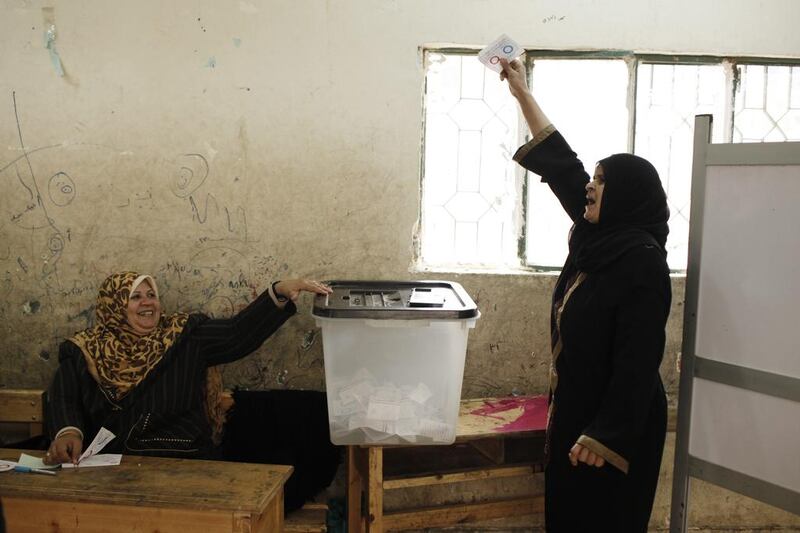CAIRO // Two hours before polls opened in Cairo, an explosion outside a courthouse near a polling station reverberated through the surrounding streets.
No one was injured in the 7am blast but glass was strewn on the street outside the court in the Imbaba district and on the opposite side of the road shop fronts were damaged by the force of the explosion.
Despite the threat of violence, crowds gathered outside the court waiting to cast their vote in the referendum on a new constitution, many of them holding posters of the military chief, Gen Abdel Fatah El Sisi who is widely tipped to be Egypt’s next president.
“We will not be scared out of voting,” said Wael Kamal, who lives behind the courthouse and heard the explosion.
“I don’t want the Brotherhood’s dictatorship and lack of democracy, nor do I want Mubarak’s regime back. I want the army and Sisi, that’s who I believe in,” the 28-year-old said, as he stood in line waiting to vote “yes”.
Others views were more extreme, reflecting sentiment against the Muslim Brotherhood, the Islamist group of former president Mohammed Morsi who was removed from power last year.
“I want the Muslim Brotherhood dead, I want them all to be killed and slaughtered so we can be rid of them once and for all,” said Sayed Harbi, a 42-year-old newspaper and drinks seller outside the courthouse. His small shop’s windows were broken in the explosion. He was voting “yes” for the constitution and “yes” for Gen El Sisi, he said.
The Brotherhood had called for a boycott of the referendum on charter, which guarantees gender equality and bans religion-based political parties. While many queuing to vote said they opposed the Brotherhood, the referendum has created tension between Egyptians.
Ahmed Ibrahim and Dr Ibrahim Kamel have been friends for more than 20 years. They are neighbours in the working-class area of Omraneya in the province of Giza, south-west of Cairo, and they are both Salafis — believers in a strict interpretation of Islam. And yet on the first day of Egypt’s referendum they took opposing stands: Mr Ibrahim is voting yes, while Mr Kamel is boycotting.
A majority yes vote for this constitution would represent “a strong step forward in terms of the road map, leading to calm and stability”, said Mr Ibrahim, 40, a senior member of the Salafist Nour Party in Giza.
The Nour Party was the only Islamist party to call on Mr Morsi to step down in July after unprecedented numbers of Egyptians took to the streets to protest against his government and the constitution he had pushed through by using his executive powers.
Mr Kamel, 42, an orthopaedist at a government hospital in Giza, sees things differently. He is a founding member of the Al Watan Party, which split from the Nour Party in January 2013 over disagreements in leadership.
“We want the country to calm down and stabilise, but the political and societal divisions that exist in Egypt are very dangerous,” said Mr Kamel. “I might be upset with Mr X, and if he has a wedding I won’t go, but if there’s a death in his family, of course, I would go. Now, we see Egyptians happy at the death of their brothers, and they’re encouraging it, and this is really dangerous for our society. This is even more dangerous than the new constitution.”
Mr Kamel also said he opposed the lack of freedom in the lead-up to the referendum, with people campaigning for a “no” vote being arrested, while “yes” posters were draped prominently across Cairo.
foreign.desk@thenational.ae





